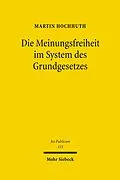Martin Hochhuth develops a new concept of constitutional interpretation, which he tests by using the most problematic freedom of speech cases from "Lüth" to "Stolpe" and "Benetton".
The German Basic Law of 1949 is, together with other post-dictatorial constitutions, a new step in world constitutional history. Unlike its predecessors from the epochs of the American and the French Revolution up to the Weimar Republic, it must be regarded as a system. This means that the function of the judge changes. His personal views become less important, and arguments such as the 'political question doctrine' and 'judicial self-restraint' become impossible. The constitution itself has laid down the values that are to be strengthened and enforced by the state and its courts. Thus legal positivism has lost its formality and must become a positivism of values. Martin Hochhuth has developed a new concept of constitutional interpretation, which he tests using the most problematic freedom of speech cases from "Lüth" to "Stolpe" and "Benetton".
Autorentext
Studium der Rechtswissenschaft, Politik und Philosophie in Hamburg, Konstanz und Freiburg i. Br.; 1998 Promotion; 2005 Habilitation; z.Zt. Lehrstuhlvertretungen am Institut für Öffentliches Recht sowie am Institut für Staatswissenschaft und Rechtsphilosophie der Universität Freiburg.
The German Basic Law of 1949 is, together with other post-dictatorial constitutions, a new step in world constitutional history. Unlike its predecessors from the epochs of the American and the French Revolution up to the Weimar Republic, it must be regarded as a system. This means that the function of the judge changes. His personal views become less important, and arguments such as the 'political question doctrine' and 'judicial self-restraint' become impossible. The constitution itself has laid down the values that are to be strengthened and enforced by the state and its courts. Thus legal positivism has lost its formality and must become a positivism of values. Martin Hochhuth has developed a new concept of constitutional interpretation, which he tests using the most problematic freedom of speech cases from "Lüth" to "Stolpe" and "Benetton".
Autorentext
Studium der Rechtswissenschaft, Politik und Philosophie in Hamburg, Konstanz und Freiburg i. Br.; 1998 Promotion; 2005 Habilitation; z.Zt. Lehrstuhlvertretungen am Institut für Öffentliches Recht sowie am Institut für Staatswissenschaft und Rechtsphilosophie der Universität Freiburg.
Titel
Die Meinungsfreiheit im System des Grundgesetzes
Autor
EAN
9783161512353
ISBN
978-3-16-151235-3
Format
E-Book (pdf)
Hersteller
Herausgeber
Digitaler Kopierschutz
Adobe-DRM
Dateigrösse
1.62 MB
Anzahl Seiten
425
Jahr
2007
Untertitel
Deutsch
Lesemotiv
Unerwartete Verzögerung
Ups, ein Fehler ist aufgetreten. Bitte versuchen Sie es später noch einmal.
